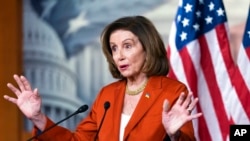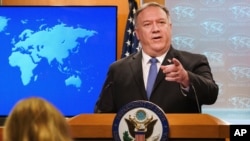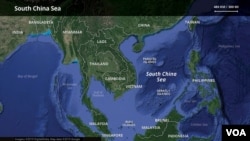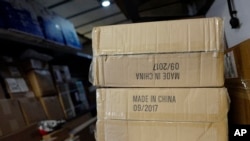U.S. President Joe Biden and Chinese President Xi Jinping spoke at length Thursday morning amid tensions over a proposed visit to Taiwan by U.S. House Speaker Nancy Pelosi, which Chinese Foreign Ministry spokesperson Zhao Lijian has warned would “be met with forceful measures.”
In a briefing to reporters, a senior administration official said that the two leaders discussed a range of issues.
On Taiwan, in its brief readout of the call, which lasted over two hours, the White House said: “President Biden underscored that the United States policy has not changed and that the United States strongly opposes unilateral efforts to change the status quo or undermine peace and stability across the Taiwan Strait.”
This was the fifth call between the leaders since Biden took office in 2021.
U.S. lawmakers’ trips to Taiwan are seen by Beijing as contradictory to Washington’s “One China” policy that recognizes Beijing as the sole government of China. Beijing views self-ruled Taiwan as a breakaway province.
The speaker’s potential visit is viewed as especially fraught as she is second in succession to the presidency, after Vice President Kamala Harris.
Chinese state media reported that Xi told Biden on Thursday the U.S. should abide by the “One China” principle and ensure that its actions are consistent with its words.
“Those who play with fire will only get burned,” Xi reportedly told Biden during a phone call. “Hope the U.S. side can see this clearly.”
When asked what the two leaders said about Pelosi’s proposed Taiwan trip, the official said: “The two leaders had an in-depth discussion of Taiwan, and as I noted, the president reaffirms our policy, but I’m not going to get into the details beyond that. On the question of the speaker’s potential travel, I know that, you know, no trip has been announced and as we said previously, it’s her decision.”
The Biden administration said it has no power to dictate travel by members of Congress, but officials said they have explained that a visit by Pelosi could trigger a crisis across the Taiwan Strait.
The Chinese Foreign Ministry’s Zhao criticized the proposed trip when it became public last week, saying it would “seriously undermine China’s sovereignty and territorial integrity.”
Speaking in Chinese, he said, “If the U.S. side obstinately clings to this course, China will definitely take resolute and forceful measures to firmly defend its national sovereignty and territorial integrity.”
Concerned by the vague threat, Pentagon officials told The Associated Press that if Pelosi continued with plans, the military would increase its movement of forces and assets in the Indo-Pacific region. Fighter jets, ships, surveillance assets and other military systems would likely be used to provide overlapping rings of protection for her flight to Taiwan and any time on the ground there.
Poor timing
Many China watchers believe a visit by the speaker will escalate tensions created by Biden’s statement during his Asia trip in May that Washington has a commitment to defend Taiwan should Beijing attack. Additionally, former secretaries of state and defense during the Trump administration, Mike Pompeo and Mark Esper, suggested the United States abandon the “One China” policy during visits to Taipei earlier this year.
“Xi feels that the United States is changing the status quo, with Biden saying the U.S. has a commitment to defend Taiwan and Republicans suggesting doing away with the ‘One China’ policy. They see Pelosi’s visit as another move in this direction,” Zack Cooper, senior fellow at the Washington-based American Enterprise Institute, told VOA.
The timing is also sensitive as Chinese Communist Party senior leaders are about to gather for their annual summer retreat, which comes just months ahead of a National Party Congress. At the congress, which happens once every five years, Xi is expected to seek an unprecedented third term in office.
While some observers say Xi’s preparations for the congress could deter him from launching a major escalation, others say some sort of forceful Chinese response is inevitable and there are real risks of accidental or inadvertent escalation.
“Ahead of the party congress, Xi will have to show strength,” Cooper said.
South China Sea
According to the White House, the pair did not have an in-depth discussion about tensions in the South China Sea, over which Beijing claims sovereignty. Washington has often called out Beijing’s militarization in those strategic waters and China’s “coercive and aggressive behavior” toward countries and territories in the region.
“They did not have an opportunity to talk in depth about the South China Sea but did talk, broadly speaking, about concerns about ways in which the Chinese activities are at odds with the international rules-based order,” the official said.
Brunei, China, Malaysia, the Philippines, Taiwan and Vietnam hold territorial claims over parts of the sea, which includes the disputed Paracel and Spratly islands.
China also announced military exercises in the sea earlier in July in response to a patrol operation by the U.S. Navy.
China tariffs
Also on the agenda was discussion of Trump-era U.S. tariffs on China, which National Security Council spokesman John Kirby described as “poorly designed.” The tariffs impose duties of about 25% on billions of dollars’ worth of Chinese imports.
“President Biden explained to President Xi President Biden’s core concerns with China’s unfair economic practices, which harm American workers and harm American families,” the administration official said. “But he did not discuss any potential steps he might take with President Xi and it would be wrong to believe that somehow a decision on any next steps was somehow waiting for this conversation.”
Beijing has called the U.S. tariffs “irresponsible,” and when asked in June, Foreign Ministry spokesman Wang Wenbin said, “With inflation rates running high across the globe, the U.S. needs to lift all the additional tariffs imposed on China, as this will serve the interests of businesses and consumers and benefit both countries and the world at large.”
“We believe that they’ve increased costs for American families and small businesses as well as ranchers,” Kirby said Tuesday of the tariffs. “And that’s, you know, without actually addressing some of China’s harmful trade practices. So we thought that the previous administration’s approach to tariffs was a shoddy deal, but I don’t have anything more.”
Also on Tuesday, National Economic Council Director Brian Deese said the issue was under “active consideration” ahead of the call.
There was no mention of tariffs in the White House readout.
Ukraine mentioned
While Taiwan and bilateral concerns figured prominently in the Biden-Xi call, the two leaders also touched on Russia’s invasion of Ukraine.
“I would not characterize any particular breakthroughs that I personally saw in that conversation” on Ukraine, a senior administration official told reporters. “But obviously given, you know, the sort of global impact of Russia’s war in Ukraine, as well as the very specific impact on the Ukrainian people, and on the European continent, it’s an incredibly important issue for the two leaders to continue to discuss and for President Biden to make very clear his concerns there.”
VOA’s Chris Hannas contributed to this report.




